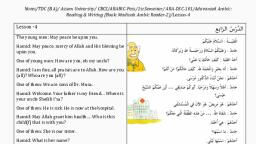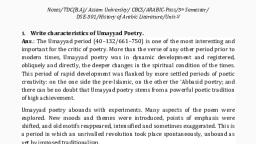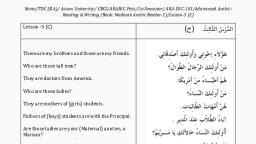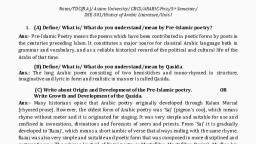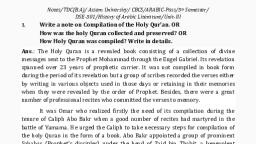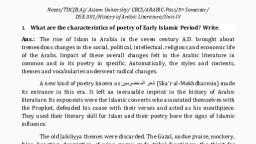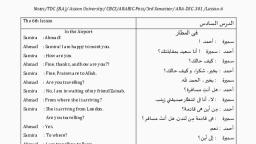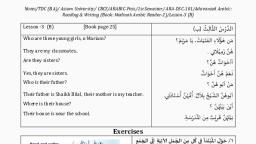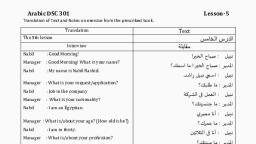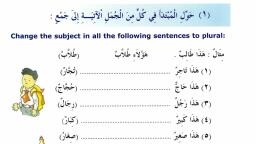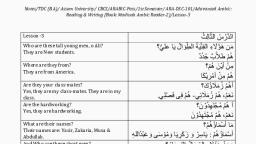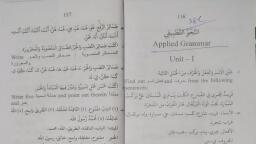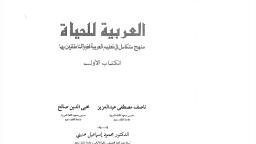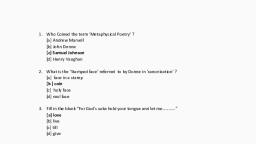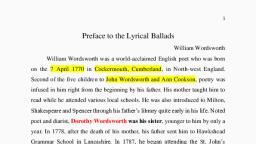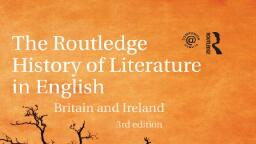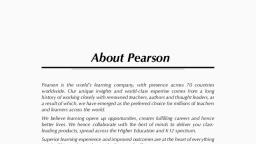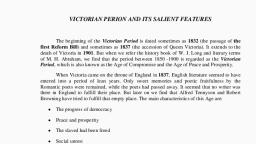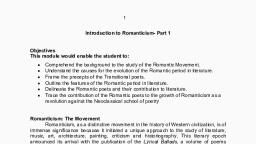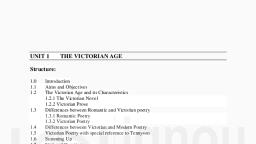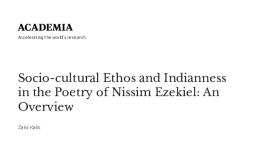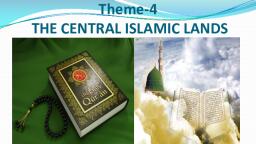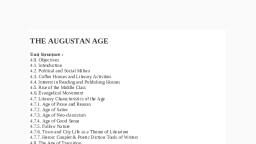Page 1 : Notes/TDC(B.A)/ Assam University/ CBCS/ARABIC-Pass/5th Semester/, DSE-501/History of Arabic Literature/Unit-II, , What is/ Define/ What do you mean by Mu‘allaqāt?, Ans:- The Mu‘allaqāt means the Suspended Odes or the Hanging Poems, is a group of seven, long Arabic poems that are considered the best work of the pre-Islamic era. These poems were, hung on or in the Ka'ba at Mecca, because of their eloquence and beauty. It brought victory to their, authors in the poetical contests traditionally held during the season of pilgrimage. It is also been, called The Mu‘allaqāt because it’s like precious gems that hangs in the mind and is watched in, silence., As defined by Hammad Ar-Rawiya, seven most famous Mu‘allaqāt poets are,: Imrul Qays , Labīd,, Tarafa, Zuhayr bin Abi Salma, Antara ibn Shaddad, Amr ibn Kulthum, Harith ibn Hilliza. Poets, sometimes numbered amongst the seven by other: Al-Nabigha, al-A'sha, 'Abid ibn al-Abras., 1., , Who is the best Muallaqat poet? Justify. OR Who is the greatest pre-Islamic poet? OR, Write an essay on the Life and works of Imrul Qais and features/characters of his poetry., Ans:- The best Muallaqat poet Imrul Qays bin Hujr al-Kindi (died c. 550 CE), is the greatest preIslamic poetry., The poet Imrul Qays of the tribe of Kindah, was foremost both in time and in poetic merit. He, is sometimes considered the father of Arabic poetry. His qasedah, or long poem, "Let us stop and, weep" is one of the seven Mu'allaqat, poems prized as the best examples of pre-Islamic Arabian, verse. He was a master of love poetry; his frank descriptions of dalliance with his mistresses are, considered so seductive that the Prophet Muhammad called him “the leader of poets on the way to, Hell.” His style is supple and picturesque. It grips the attention whether his poems sing of his love, adventures or describe a seemingly endless rainy night. Of all classical Arabic poets he is probably, the one who appeals most to modern taste., Imrul Qays was born in the Najd region of northern Arabia sometime in the early 6th, century AD. His father was said to be Hujr bin al-Harith, the Kindah monarchy's regent over the, tribes of Asad and Ghutfan, and it is believed that Imrul Qays was born in the territory of Asad. His, mother was said to be Fatimah bint Rabi'ah al-Taghlibi., Imrul Qays was the youngest of his father's sons, and began composing poetry while he was, still a child. His father strongly disapproved this habit and his scandalous lifestyle of drinking and, chasing women, and eventually banished him from his kingdom. In his exile Imrul Qays wandered, with his group of rebellious friends from oasis to oasis, stopping to drink wine, and recite poetry,, and enjoy the performance of the singing-girls, sometimes tarrying for days before packing up to, wander again.. Imrul Qays ' lovers feature large in his poetry, as he praises their graces, lambasts, their cruelty, and laments their absence and the longing in his heart., Later, when the tribe of Asad assassinated his father, Renouncing wine and women he fought, the tribe of Asad until he had exacted revenge in blood, and spent the remaining of his life trying to, regain his father's kingdom., After exacting his revenge upon the tribe of Asad and losing the support of Bakr and Taghlib,, Imrul Qays travelled all over the Arabian Peninsula and the Levant, taking refuge with different, tribes, running from his enemies and seeking support to regain his father's kingship. His last, journey was to Constantinople, to seek support from Emperor Justinian, who later on became angry, on him because he discovered that Imrul Qays had an affair with a woman in his court. So he, expelled him from there and sent a messenger with a poisoned jacket, and that Imrul Qays wore the, jacket and the poison killed him. He was also referred to as "The Lost King" (Al-Malik aḍ-Ḍalīl),, because he was never able to recover his father's throne., ****************, 2., , By- Dr. Abu Nazat Sayful Haque, (M.M., M.A., Ph.D., NET,), Asst. Prof, Dept. of Arabic, S.R. College, Kalain, Cachar. 788815, Email:
[email protected]. M-9954863722 pg. 1
Page 2 : Notes/TDC(B.A)/ Assam University/ CBCS/ARABIC-Pass/5th Semester/, DSE-501/History of Arabic Literature/Unit-II, , 3., , Who was Zuhair Bin Abi Salma? Write a biographical note on him. OR, Discuss features/ characteristics of Zuhair Bin Abi Salma’s poetry., , Ans.:, Zuhair Bin Abi Salma was one of the seven best Pre-Islamic Arabic poets. Born and, brought up in a famous family, which produced a galaxy of poets, of the tribe Muzaina in Najd of, Arabia. He composed a good number of poems. Nearing all of his poems was in affairs to the tribe of, Ghatfan or in personal events. His best poem that had been recorded in Muallaqa was in the praise, of the two chieftain of the tribe of Murrah namely Harith bin Awf and Harim bin Sinan., Characteristics of his poems:, a) His poems are regarded as the store house of maxims and ideas of life., b) His works are full of universal truth and philosophical and moral teaching., c), His verses are marked by seriousness., d) His verses convey the large number of ideas in least number of words., e) His used little for praise and large for proverbs of the then Arab., f), His works prove his skill in handling the customary erotic prelude and life and in picturing of, the then intellectual, social and cultural life., g) His works contain excellent beauty and reactionary wisdom, historical background and, describing war, desert, fidelity, conclusion of peace, bravery, generosity etc., h) His works are the great example of grand conception, beauty of expression, structural, perfection, magnificent emotion, harmonious melody and lyrical effusion., Who is Amr bin Kulthum? Write a biographical note on him. OR, Discuss features/, characteristics of his poetry., Ans.: ‘Amr ibn Kulthum al-Taghlibi ( )عمرو بن كلثومwas among the classic Arabic poets who, flourished in the century before the prophet Muhammad. Like many of the pre-Islamic poets, ‘Amr, was of high birth, a knight and a chief of the Taghlib tribe that lived in the mid-Euphrates River area, of Iraq and was famous for its glory, bravery and merciless behavior in battle.. He was the grandson, of al-Muhalhil, a celebrated Taghlib chief and poet. His inclusion in the Mu’allaqat (The Seven Odes),, the standard collection of pre-Islamic poetry, has given him a place in literary history., ʿAmr ibn Kulthūm lived to a very advanced age and highly respected for his noble character., Little is known of his life, but some of the achievements referred to his poems were later accepted, as facts. For example, one legend has ‘Amr beheading the powerful Lakhmid king ‘Amr ibn Hind (ca., 568) for allowing the poet’s mother to be insulted. Within a century of his death, reputedly by, drinking too much unmixed wine, he had become a legendary hero in Arabic tales., There are not many surviving examples of his poetry, but one of his longer poems (untitled), was included in the Mu’allaqat when it was assembled in the late eighth century. In his qasidah,, ‘Amr fiercely extols the strength, courage, and cruelty of his tribe, and hurls threats against its foes:, “Ours the right of the wells, of the springs untroubled; theirs the dregs of the plain, the rain-pools, trampled.” This type of writing is a classic example of the fakhr (boasting) often found in Arabic, poetry of the time. ‘Amr’s poem became so popular among his Taghlib tribesmen that they, expanded it in the retelling from 100 to 1,000 lines, and the ode has since influenced subsequent, generations of Arabic poets. He has only four poems that have survived: Ala Hobbey Besahnek, Fasbahina (The Muallaqah), Aagma` Sohbaty , Ala Min Mobalgha, and En Nasrkom Ghada. He died in, 584 A.D., 4., , ******************, , By- Dr. Abu Nazat Sayful Haque, (M.M., M.A., Ph.D., NET,), Asst. Prof, Dept. of Arabic, S.R. College, Kalain, Cachar. 788815, Email:
[email protected]. M-9954863722 pg. 2

